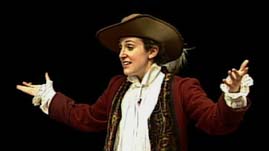Teachers' Domain - Digital Media for the Classroom and Professional Development
User: Preview



John Basil, founding member of the American Globe Theatre in New York City, directed graduate students from Penn State's School of Theatre in this production of selected scenes from William Shakespeare's Twelfth Night during Penn State's 2007 theatre season.
Jennifer Evans, Josie Gildow, and Gary Masquelier, English teachers from central Pennsylvania, wrote lesson plans based on these video segments.

In this video from Penn State's School of Theatre production of Twelfth Night, Malvolio tracks down Viola (still posing as Cesario) and returns a ring that Olivia claims she received but does not want from him. At first, Viola is perplexed, but she soon realizes—much to her dismay—that Olivia has fallen in love with Cesario. By the end of her famous soliloquy, Viola expresses concern about the love triangle that has emerged: she wants Orsino; Orsino wants Olivia; Olivia wants Cesario. Too overwhelmed to know how it will turn out, Viola declares that only time will tell.
Viola (dressed as Cesario) has left Olivia’s house after giving her Orsino’s message. Malvolio runs after her and gives her a ring that she supposedly dropped in Olivia’s house. Viola is initially perplexed by this, but soon realizes that Olivia has fallen in love with her and given her the ring as a token. This scene includes the famous soliloquy by Viola wherein she ponders the love triangle. She also criticizes women for giving their hearts away a little too easily. This is ironic; she, too, falls for a man (Orsino) who fancies himself to be in love with another woman and revels in her rejection! Her outburst is very likely a result of her exasperation at finding herself in such a strange situation. Not only has Olivia fallen for the messenger of the man who is trying to woo her, but the messenger also happens to be a woman! She is right when she says in her soliloquy, “Poor lady, she were better love a dream.” She also seems to regret this unfortunate side effect of her disguise and calls it ‘wicked’.
Malvolio’s behavior in this scene is well worth noticing. That he thinks of himself as superior to others is well understood in the earlier scene. In this scene, his behavior toward Cesario manifests the same attitude. His manners are probably worsened by the knowledge of Olivia’s feelings for the good-looking stranger. Shakespeare has chosen names that are very appropriate for the characters and Malvolio’s name immediately gives a sense of the ill mood or ‘bad will’ that he harbors. It gives a feeling of perpetual crankiness. The play does not give him a chance to show cunning, but he gives a sense of the possibility.
(Lines 27-28)
Disguise, I see thou art a wickedness / Wherein the pregnant enemy does much.
How are we to read and interpret this line? Is disguise really something wicked, or more of a wicked pleasure? Remember that this play is based entirely on mistaken identity and the visual and dramatic humor based on disguise; without it, the play would not exist! Would Shakespeare agree with Viola’s pronouncement?
(Lines 29-32)
How easy it is for the proper false / In women’s waxen hearts to set their forms! / Alas, our frailty is the cause, not we, / For such as we are made of, such we be.
What do these lines suggest about women? Do all women in the play fit this description? Do you think Viola truly believes this, even about herself?
 Loading Standards
Loading Standards